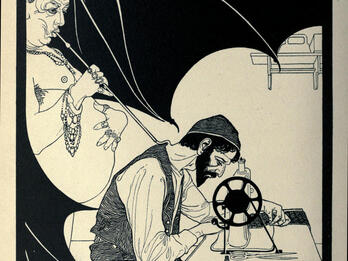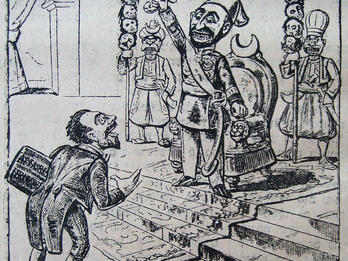The Third Party Convention
The Bund has inscribed on its banner the demand for equal civil rights for the Jews. At the Convention the opinion was expressed that Jewish Social Democracy deals with the needs of the Jewish proletariat in too narrow a manner. Many of the most significant rights to be obtained with the fall of the autocratic regime [of the czar], it was observed, would, as regards the Jewish workers, remain but a dead letter, if complete national emancipation, e.g., freedom to use their own national language, is not also granted them. Accordingly, one comrade1 insisted that there be a greater emphasis on the national aspect of The Bund’s program, for the Jewish proletariat must demand national emancipation as well as equal civil rights. Civil rights, he said, are not enough to enable the Jewish proletariat to protect its own interests. Germany is a prime example of this. Whereas in Germany all citizens enjoy equal civil rights under the law, the Polish workers [residing in Germany and possessing German citizenship] cannot enjoy them to the same extent as the German workers. The Polish worker, like his German comrade, is allowed to convene meetings, but because the commissars who must be present at the meetings do not usually understand Polish, the meetings must be conducted in German. This means that many who are unable to express their thoughts in German or do not understand that language sufficiently, are in practice denied their right to participate in the meetings. If this is the case with regard to the Polish proletariat in Germany, how much more so does this hold for the Jewish workers in Russia. One may ask—what benefit will derive from the Jewish workers’ freedom of assembly, if in these meetings they must speak Russian, that is to say, a language neither spoken nor understood by the majority of the Jewish workers? Freedom of assembly is thus revealed to be a fine but empty phrase, at least as regards the Jewish workers, as long as Yiddish does not enjoy a status equal to that of Russian. Thus it is necessary to correct the program of The Bund by supplementing the paragraph on equal civil rights with one on equal national rights. It is possible of course to contest this point, continued that comrade, and say that the question of equal national rights is merely of academic interest to us at this time; that the most important task facing us, the task to which we must now devote ourselves fully, is the achievement of political rights. The question of national rights is not likely to become a burning issue for the Jewish worker nor become his battle-cry until there be a democratic regime in Russia, and then only if the democratic character of the Russian constitution be imperfect. Those who present this argument, the comrade continued, forget that every party includes in its program, alongside its short-term demands, demands which may be realized only in the distant future. The Bund should not be an exception in this regard. It must include in its program demands which in all likelihood will be fought for in the more or less distant future.
The paragraph on equal national rights received little support from the congress and aroused a heated debate, involving many of the delegates. Essentially, the discussions focused on the need to avoid making demands which would divert the worker from his class interests by the pull of [spurious or less urgent] national interests. The danger in having The Bund’s program include a demand for comprehensive equality of national rights lies in the possibility that it will blur the Jewish proletariat’s class consciousness, and, like every nationalism, it could lead to chauvinism.
After lengthy discussion the following decision was passed: 1) The demand for equal civil rights but not equal national rights should be included among The Bund’s political demands. 2) To enable comrades to express their opinions on the national question and help clarify the subject, a special section entitled “Arguments” will be set aside for this purpose in the [party’s paper] Yiddisher Arbeter there individual authors may express their opinions, on their own responsibility. . . .
Notes
Words in brackets appear in the original translation.
The reference is to John Mill (1870–1952), one of the founders of The Bund and head of its Committee Abroad.
Credits
Published in: The Posen Library of Jewish Culture and Civilization, vol. 7.




